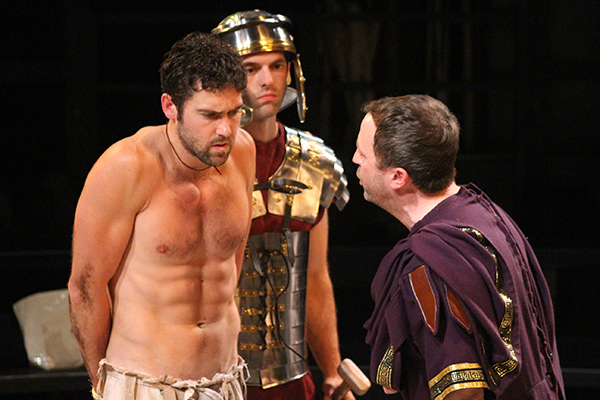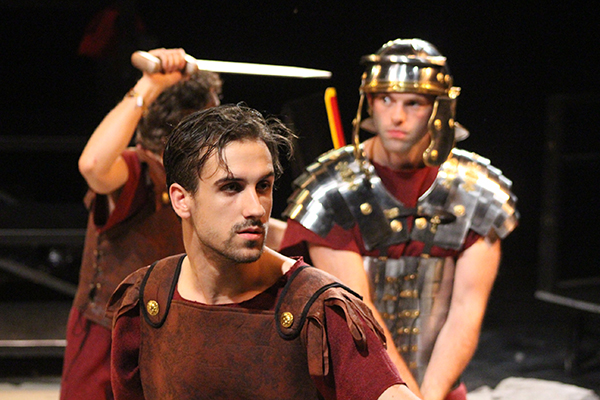
Credit: Adam Beauchesne
At the Jericho Arts Centre, in repertory, until August 20, 2016
ensembletheatrecompany.ca or at the door
Posted August 2, 2016
Even Shakespeare’s Titus Andronicus doesn’t come close to the body count in The Romans in Britain now running in repertory with Betrayal and The Country Wife on the Jericho Arts Centre stage. Directed by Richard Wolfe for Ensemble Theatre Company (ETC), throats are slit, bodies stabbed, heads bashed in with rocks and men machine-gunned down in the course of a couple of hours. And although there is undoubtedly sodomy going on in Shakespeare’s plays, we don’t see it onstage as we do in The Romans in Britain. (The first production, at London’s National Theatre in 1980, caused a sensation when a prosecution for gross indecency was launched against the director. Even though the suit was unsuccessful, the play was not produced again for years.)
In this ETC production, both the sodomizer, a Roman, and the sodomized, a young Druid priest, are clothed, but it’s still pretty graphic.
The play opens with all seventeen actors parading on stage while a couple of characters define the performing area by streaming sand around the periphery. All but two – Conlag and Daui, criminals on the run – then leave. The first lines are Conlag’s: “Where the f**k are we?”
We are somewhere north of the River Thames and the year is 54BC. Thirty thousand Romans, dressed in helmets and metal armour, carrying spears, shields and swords, are on the move; the ragged locals, living hand to mouth, will resist with sticks and stones.

Credit: Adam Beauchesne
British playwright Howard Brenton presents a bleak and sprawling epic of wave after wave of brutality beginning with the local farmer/tribesmen who, upon discovering Daui and Conlag in their field, kill Daui, drain his blood and pour it on the soil. Wounded, Conlag escapes into the forest. Much worse is yet to come after the Romans arrive.
Brenton attempts to illustrate the parallels between the brutality of the Roman invasion of England and the ruthlessness of the English in Ireland. But what we actually experience is what we all fear: war is brutal, ongoing and inevitable. Everyone is out to kill everyone else in The Romans in Britain.
Ironically, but not surprisingly, there is so much violence in the play, we are distanced and make no attachment emotional or even political attachment to any of the characters. Perhaps that detachment – equivalent to the detachment soldiers in the field must make in order to preserve their sanity – is Brenton’s point.
Part Two, which takes place in ‘Modern Times’ and in 515AD, presents a hero of sorts and then goes on to posit a bizarre source of the Arthurian legend: a Celt on the run from the Saxons decides to change his profession from cook to poet. His first poem is about an imaginary king: “His Government was the people of Britain. His peace was as common as rain or sun… He died by the treachery of his best friend…” It was, the cook-cum-poet, fantasizes, “a golden age, lost and yet to come.” That king’s name? “Er, – any old name. Arthur? Arthur.” Camelot and all that? A figment of a cook’s imagination.
Performances in this largely non-professional cast are uniformly good; particularly well cast is Ashley O’Connell in a variety of roles. Rebecca Walters, as a clan chief, brings authority and great dignity to the role.
After a 2006 production in Sheffield, the Guardian critic Michael Billington wrote that the play “is deeply flawed”. It’s hard to follow. The poetic language gets in the way of clarity. And the unheroic English hero in Part Two is a smart-ass and hard to like even if he is prepared to wear the guilt of decades of English imperialism.
The Romans in Britain is an ode to a glorious England that, according to Brenton, never was and might never be.

